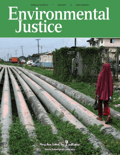
Environmental Justice
Scope & Guideline
Exploring the nexus of justice and sustainability.
Introduction
Aims and Scopes
- Interdisciplinary Research:
The journal emphasizes research that crosses disciplinary boundaries, integrating perspectives from environmental science, public health, sociology, law, and policy to address complex environmental justice issues. - Community-Based Approaches:
A strong focus on community engagement and participatory research methods is evident, highlighting the importance of involving affected communities in environmental decision-making processes. - Social Equity and Injustice Analysis:
The journal consistently addresses issues of social inequity, exploring how systemic racism, economic disparities, and historical injustices manifest in environmental contexts. - Policy Advocacy and Impact Studies:
Research published often aims to influence policy by providing evidence-based recommendations that promote environmental justice and equitable resource distribution. - Cultural and Indigenous Perspectives:
The inclusion of indigenous knowledge and cultural perspectives is a unique contribution, emphasizing the importance of traditional ecological knowledge in environmental governance and justice.
Trending and Emerging
- Climate Justice:
There is an increasing emphasis on climate justice, particularly how climate change disproportionately affects marginalized communities and the need for equitable climate adaptation strategies. - Intersectionality in Environmental Justice:
Recent articles highlight the importance of intersectionality, examining how various identities (race, gender, class) intersect to shape experiences of environmental injustice. - Health Impacts of Environmental Injustice:
A notable trend is the focus on public health implications of environmental injustices, particularly in relation to air quality, water access, and exposure to hazardous materials. - Technological Innovations for Justice:
Emerging research explores the use of technology and data-driven approaches to promote environmental justice, including GIS mapping and community science initiatives. - Indigenous Rights and Environmental Sovereignty:
There is a growing body of work dedicated to indigenous rights and the role of traditional ecological knowledge in advancing environmental justice, reflecting a shift towards acknowledging indigenous sovereignty.
Declining or Waning
- Purely Theoretical Discourse:
There has been a noticeable decline in articles that focus solely on theoretical frameworks of environmental justice without empirical application or community involvement. - Historical Environmental Justice Cases:
Research centered exclusively on historical case studies of environmental justice has decreased, as there is a shift towards contemporary issues and current advocacy efforts. - Environmental Justice and Economic Growth:
The integration of economic growth narratives with environmental justice concerns has become less frequent, indicating a potential shift away from discussions that prioritize economic development over social equity. - Traditional Environmental Science Approaches:
The journal has moved away from purely scientific studies that do not incorporate social justice implications, favoring research that directly connects environmental science with community impacts. - Urban Focus Exclusivity:
There has been a reduction in studies that exclusively focus on urban environmental justice issues, with a growing interest in rural and global contexts.
Similar Journals

NATURAL RESOURCES JOURNAL
Fostering dialogue for informed policy-making in natural resources.Welcome to the NATURAL RESOURCES JOURNAL, a scholarly publication dedicated to the intersection of law and environmental sciences. Published by the University of New Mexico School of Law, this journal has been a crucial platform since 1977 for scholarly discussions and research that shape our understanding of natural resources management and policy. With an impressive impact factor in the realm of law, ranking in the top 60th percentile, and recognized in the Environmental Science category, it serves as an essential resource for researchers, professionals, and students alike. Although not an open-access journal, it provides in-depth analyses and original research that are pivotal in addressing pressing environmental issues. Our objective is to foster interdisciplinary dialogue and enhance legal frameworks related to natural resource management, ensuring a sustainable future through informed policy-making. Join our community of scholars in exploring the multifaceted challenges and innovations in the field.
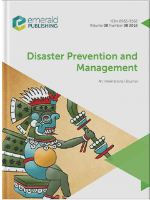
Disaster Prevention and Management
Advancing resilience through research and innovation.Disaster Prevention and Management, published by Emerald Group Publishing Ltd, is a leading journal in the fields of disaster management, public health, and environmental policy. With an ISSN of 0965-3562 and an E-ISSN of 1758-6100, this journal has made significant contributions to both theoretical and practical advancements since its inception in 1992. Operating from the United Kingdom, it holds a Q2 ranking across various categories, including Business, Management and Accounting, Health (Social Science), and Public Health, reflecting its pivotal role in academic discourse and policy formulation. By engaging with contemporary issues related to disaster risk reduction, emergency preparedness, and resilience strategies, Disaster Prevention and Management aims to foster a multidisciplinary approach, making it a vital resource for researchers, practitioners, and students seeking to navigate the complexities of disaster scenarios effectively. With an impressive Scopus ranking across multiple categories, researchers are encouraged to explore its diverse range of articles and reports available for their academic and professional endeavors.
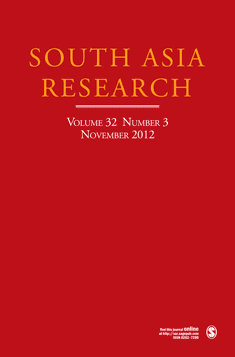
South Asia Research
Unraveling the Threads of South Asia's Diverse NarrativesSouth Asia Research, published by SAGE Publications India Pvt Ltd, is a prestigious academic journal dedicated to the exploration and analysis of socio-economic, cultural, and political dynamics within South Asia. Established in 1981, this journal has become a vital resource for scholars, researchers, and practitioners interested in the region's multifaceted issues. With an impressive reputation reflected in its Q2 category rankings across various disciplines—Arts and Humanities, Economics, and Social Sciences—it maintains a commendable position within the academic community. Although it is not an open-access journal, the insights published are invaluable for advancing knowledge and sparking dialogue about South Asia's development and challenges. By providing a platform for rigorous research and interdisciplinary collaboration, South Asia Research plays a crucial role in shaping contemporary discourse in the region and beyond.

Journal of Environmental Studies and Sciences
Championing rigorous research in environmental studies.Journal of Environmental Studies and Sciences, published by SPRINGER, serves as a pivotal platform for advancing the field of environmental science and related disciplines. With an ISSN of 2190-6483 and E-ISSN of 2190-6491, this esteemed journal has established itself as a reputable source of knowledge since its inception in 2011. Covering an expansive range of topics related to environmental studies, the journal has achieved a commendable position within the academic community, evidenced by its 2023 category quartiles, ranking in the Q2 tier for both Environmental Science (miscellaneous) and Geography, Planning and Development. The journal's Scopus rankings further highlight its impact within the fields of Geography, Planning and Development, and General Environmental Science, boasting a respectable percentile rank of 69th and 58th respectively. Although it does not currently offer Open Access, the Journal of Environmental Studies and Sciences remains an essential resource for researchers, professionals, and students aiming to explore critical environmental issues, engage with innovative research, and contribute to sustainable development practices. Its ongoing commitment to academic rigor ensures that it continues to play a vital role in shaping the discourse around environmental challenges and solutions.
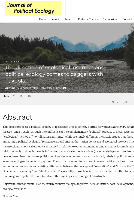
Journal of Political Ecology
Unraveling the Complex Ties Between Society and NatureJournal of Political Ecology is a prestigious, open-access publication that has been at the forefront of interdisciplinary scholarship since 1994, hosted by UNIV ARIZONA LIBRARIES in the United States. This journal, identifiable by its ISSN 1073-0451, focuses on critical analyses of environmental issues as they intersect with social and political factors, making it an essential resource for researchers in the fields of Political Science, Geography, and Ecology. As of 2023, it boasts impressive rankings including Q1 in Geography, Planning and Development and Political Science and International Relations, highlighting its significant impact in these categories. Additionally, the journal ranks in the 86th percentile for Political Science and International Relations, further solidifying its position as a leading publication. The convergence of its content from 2011 to 2024 reflects a commitment to exploring contemporary environmental challenges through a political lens, catering to an audience of academics, practitioners, and students. With its strong reputation and commitment to open access, the Journal of Political Ecology is an invaluable platform for advancing scholarly discourse in an increasingly complex and interconnected world.

AMERICAN JOURNAL OF COMMUNITY PSYCHOLOGY
Empowering communities with impactful psychological insights.American Journal of Community Psychology, published by Wiley, is a premier journal dedicated to advancing the field of community psychology through innovative research and practical applications. With an impressive impact factor and categorized in the prestigious Q1 quartiles across several disciplines—including Applied Psychology, Health (social science), Public Health, and Social Work—this journal serves as a vital platform for researchers, practitioners, and students alike, fostering a deeper understanding of the psychological dimensions of community life. Established in 1973 and continuously thriving until 2024, it provides a critical forum for scholarly articles that explore the intricate interactions between individuals and their communities. The journal’s commitment to high-quality research is evident in its significant Scopus rankings, which place it among the top-tier publications in its field. Although currently not open access, the journal’s repository is rich with essential insights and findings that contribute to the ongoing dialogue in community mental health and well-being.

ERDE
Exploring Earth's Complexities, One Article at a Time.ERDE is an esteemed open-access journal published by the GESELLSCHAFT ERDKUNDE BERLIN, specializing in a broad spectrum of fields including Atmospheric Science, Earth and Planetary Sciences, Ecology, and Social Sciences. Since its inception in 1977, ERDE has established itself as a pivotal resource for researchers, professionals, and students, providing a platform for high-quality, peer-reviewed research articles that contribute significantly to these disciplines. With a current impact factor reflected in its Q3 ranking within several categories and notable Scopus rankings, the journal emphasizes interdisciplinary approaches that address complex global challenges. Open access since 2013, ERDE ensures that its research is accessible to a wider audience, fostering collaboration and knowledge sharing across the globe. This commitment to disseminating cutting-edge research is vital in an era where understanding environmental and societal shifts is crucial for sustainable development.
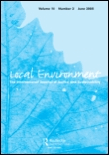
Local Environment
Navigating the complexities of local and global environments.Local Environment is a prestigious academic journal focused on the multifaceted relationships between local environmental changes and global issues, aiming to bridge the gap between policy, community engagement, and sustainable development. Published by ROUTLEDGE JOURNALS, TAYLOR & FRANCIS LTD, this journal has established itself as a leading platform in the fields of geography, planning, and environmental management, boasting an impressive Q1 ranking in Geography, Planning and Development, and a Q2 ranking in Management, Monitoring, Policy and Law for 2023. The journal, with an ISSN of 1354-9839 and E-ISSN 1469-6711, provides an essential resource for researchers, professionals, and students dedicated to exploring innovative approaches to local environmental issues, making significant contributions to both academic scholarship and practical policy implementation. With a commitment to disseminating high-quality research from 1996 to 2024, Local Environment encompasses a wide range of topics crucial for understanding local actions in a global context, further ensuring its relevance and impact in a rapidly changing world.
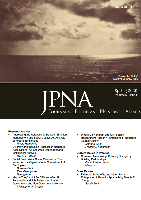
Journal of Public and Nonprofit Affairs
Fostering Innovation for Societal ImpactThe Journal of Public and Nonprofit Affairs, published by the MIDWEST PUBLIC AFFAIRS CONFERENCE, serves as a premier platform for scholarly discourse within the realms of public administration, nonprofit management, and social welfare. Established as an open-access journal since 2015, it ensures that research is accessible to a wide audience, fostering knowledge transfer among scholars, practitioners, and students alike. The journal has garnered recognition with its Category Quartiles ranking in 2023, featuring Q2 placements in Business and International Management, Economics, and Public Administration, among others. Its robust Scopus rankings further underscore its impact, positioning it within the top percentiles across its various fields. With a commitment to advancing understanding and practice in the public and nonprofit sectors, the journal invites contributions that push the boundaries of existing knowledge and foster innovative approaches to pressing societal challenges. For those seeking to contribute to impactful conversations, the Journal of Public and Nonprofit Affairs is an indispensable resource.

Novos Cadernos NAEA
Advancing knowledge in social sciences and environmental studies.Novos Cadernos NAEA is a prominent open-access journal published by Universidade Federal do Pará, dedicated to advancing the field of applied social sciences and environmental studies. Since its inception in 1998, this journal has established itself as a vital platform for researchers and practitioners to disseminate innovative research, engage in scholarly conversations, and promote interdisciplinary approaches to contemporary issues affecting society and the environment. With an ISSN of 1516-6481 and an E-ISSN of 2179-7536, it aims to enhance accessibility to knowledge by ensuring that all articles are freely available online, thereby supporting the global academic community. The journal's commitment to quality research is evident, making it an essential resource for scholars, students, and policymakers looking for cutting-edge analysis and insights in their fields.